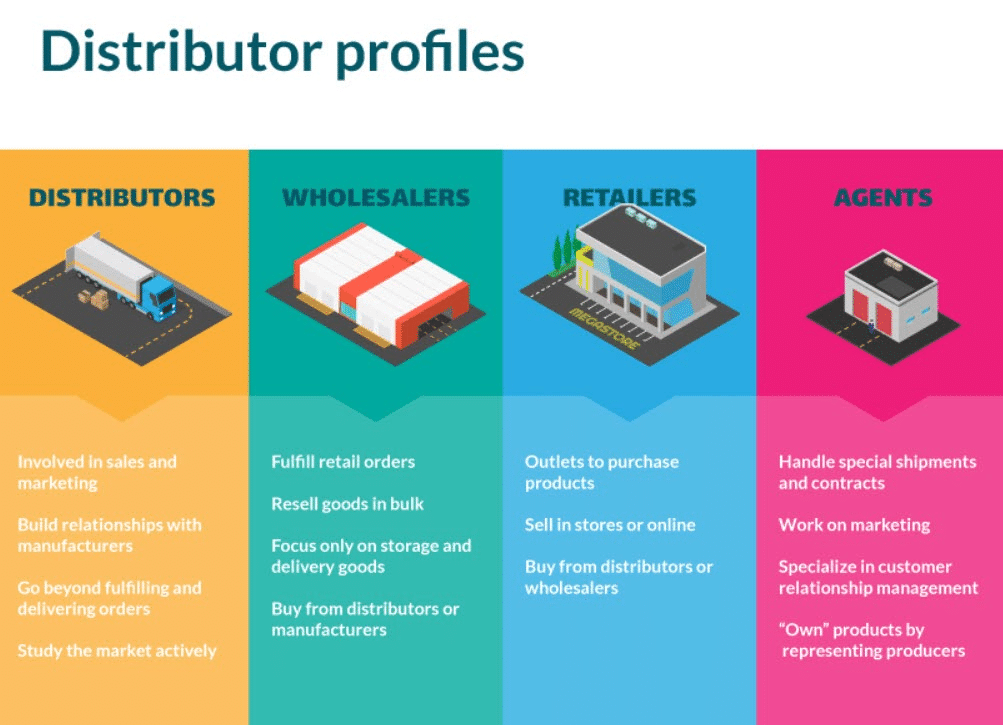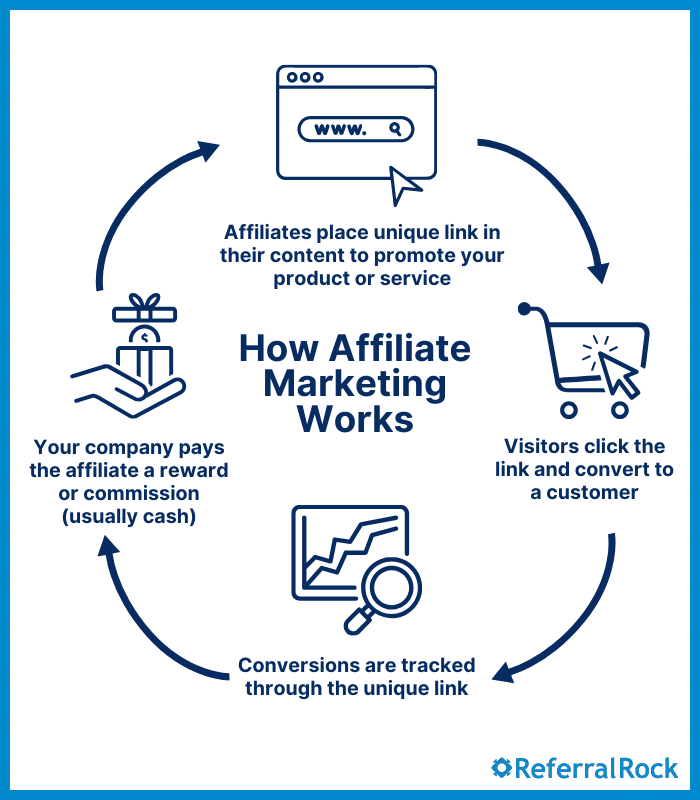Affiliate vs. partner marketing – what’s the difference? And which is best for your business?
Affiliates and partners actually have more in common than you think. After all, affiliate marketing is considered a type of channel partnership. Still, a few distinct features set affiliate marketing apart from other channel partnerships.
Today, we break down the similarities and differences between affiliates and partners. We also cover what sets affiliate and partner marketing apart from another closely related type, referral marketing.
Finally, we help you find out whether setting up an affiliate program, channel partnership program, or a referral program is best for your unique business model.
Affiliate vs. partner marketing: The basics
What are affiliate marketing and partner marketing all about? Let’s start with the basics:
With affiliate marketing, you formally recruit bloggers, influencers, and other content creators as your affiliates to promote your products or services on their own channels. Each affiliate places links to your website on their own social media accounts, blogs, or websites. Every time someone clicks on an affiliate’s link and makes a purchase, the affiliate earns a commission.
Channel partner marketing (also called partner marketing) refers to any partnership with a third party that helps market and/or sell the products or services of your company. This third party could be a business or an individual.
Types of channel partners can include:
- Retailers: who sell your products through their own storefronts
- Wholesalers or distributors: who buy your products and then sell them to other retailers
- Brokers: who help establish distribution relationships between companies
And as we mentioned above, affiliates count as channel partners. Although they don’t handle your products directly, they’re still channel partners since they market your products in partnership with your company.

Regardless of the type of partner, channel partners are usually rewarded for every sale they help you make as part of a channel partner incentive program. These incentives motivate partners to promote and generate more sales of your products.
Differences between affiliates and partners
Now let’s break down the main differences between affiliates and partners in detail, to help you determine which type is right for your brand.
Their role in marketing and sales
| Affiliates | Other partners |
|
|
Affiliates are always content creators – bloggers, social media personalities, or website owners. They use their own content channels to promote and link to your brand. Many affiliates are individuals, but sometimes, digital publishing companies (like Buzzfeed and Wirecutter) are the affiliates of other companies (like Amazon). Affiliates don’t need to have a personal experience with your brand. They simply need to highlight products their audience is likely to enjoy.
Other types of channel partners aren’t content-centric. They may help market your products, especially since they’re incentivized for the sales that come through their efforts. But they’re largely focused on distributing your products. For the most part, these channel partners are businesses (although they can be individuals from agencies). You’ll likely work closely with sales team members from the business your company formed the agreement with.
The sales channels they’re involved with
| Affiliates | Other partners |
| Direct prospective buyers to your existing main sales channel | Open up new points of sale where your products are distributed |
Most affiliates are focused on marketing your brand. They don’t open up new points of sale through distribution or retail. They don’t physically hand off your products to buyers. Rather, affiliates are focused on directing traffic to the main sales channel – your company website – via affiliate links. This way, prospective buyers can still engage with your owned channels and purchase directly from your business.
Meanwhile, channel partners are involved with lining up new channels where your products can be distributed and sold. For instance, retailers sell your products in their own stores, while distributors and wholesalers buy your products and get them into various retail outlets.
The rewards they’re offered
| Affiliates | Other partners |
| Cash commission on each sale | Rebates, discounts, market development funds, sales performance incentives – not always cash |
Affiliates receive a commission rate on each sale made through their affiliate links. This commission could be a percentage of the sale or a flat fee. But it’s almost always paid out in cash, allowing affiliates to use their reward any way they please.
Other channel partner incentives can take many forms, including, but not limited to, cash. How partners are rewarded all depends on the structure of your partnership. They might receive rebates and discounts on the products they buy and distribute. Or they could be paid with funds to boost their marketing and sales efforts.
Sometimes, sales reps at channel partner companies receive direct rewards for meeting certain sales goals. These rewards aren’t always paid in cash. Often, they’re gift cards, tech gadgets, or other luxury perks.
Similarities between affiliates and partners
Unsurprisingly, there are many similarities between affiliates and other partners (since affiliates are a type of channel partnership). Here’s a run-through of what all affiliates and partners have in common.
They both use the power of word-of-mouth marketing
It’s no secret that prospective customers trust word-of-mouth recommendations far more than they trust ads directly from a business.
Channel partners, including affiliate partners, will formally recommend your products and services. And since partners are third parties (not employees of your business), their recommendations are more trusted and valued by the market.
They both have a formal agreement with your brand
All channel partners, including affiliates, must be carefully selected so you know they’re ethical and effective at helping you reach the right audience.
Once you’ve chosen the right partners, create a detailed channel partner agreement (sometimes called an affiliate agreement). This outlines the terms of the partnership, sets clear expectations, and protects your business if a partner engages in questionable behavior. Potential partners should read, understand, and sign this binding agreement before doing business with your company.
What to include in the contract? We’ve got you covered with our can’t-miss guide to channel partner agreements.
They both receive performance-based incentives
Both affiliate programs and other partner programs use performance-based compensation models, also called cost-per-action (CPA) models. In this model, partners receive incentives based on the amount of sales they bring in.
Affiliate partners receive commission on each sale. The more they sell, the more they earn. This model helps them stay motivated to promote your products and direct their audience to click on the affiliate links.
Channel partner incentives are also performance-based. The more products they move, the more they earn.
Examples of performance-based incentives are scaled rebates and discounts, where the more someone buys from you, the more monetary benefits they can earn.
Whichever type of partnership you choose, performance-based incentives are a win-win for your partners and your business. Not only do they foster partner motivation and loyalty to your company, performance-based incentives also protect your bottom line.
As marketing and sales are done on your behalf, you only need to pay once a desired action is completed: a successful sale, a completed sign up form, and the like. This means less customer acquisition cost (CAC) and risk for your business.
They usually don’t have a personal relationship with the prospective customer
Although affiliates and other channel partners are trusted among their own audience, they usually don’t personally know the people they refer. Rather, they’re focused on promoting and selling your products and services to anyone they think would benefit from your brand.
They are (or should be!) closely tracked through software
Affiliate marketing relies on tracking traffic that comes from affiliate links to your website, and then sending the affiliate their earned reward whenever that traffic results in a sale.
You can’t track and reward affiliates without some sort of automated process. Affiliate marketing software is your best bet because it gives you full control over your affiliate’s data and other aspects of running an affiliate program. Plus, you won’t have to pay the extra fees that existing affiliate networks charge for tracking.
Similarly, if you’re running another type of channel partner program, efficient sales tracking and attribution is key.
Using manual spreadsheets to track partner sales is time-consuming and can lead to human error. Most companies will use PRM software (partner relationship management software) to help automate tracking and see exactly who is responsible for each sale. And since the software can be set to immediately distribute any channel partner incentives, it will help keep your partners happy.
Referral Rock’s software is flexible enough to be used for all types of affiliate, partner, or referral programs. We offer free demos and let you start building your program for free, so you can see first-hand how the platform scales your business growth.
Affiliates vs. partners vs. referrals
What about referral programs? How are they different from affiliate and partner programs?
All three types of programs depend on trackable word-of-mouth sharing, and all three offer performance-based incentives (making them all types of performance marketing).
But there are a few major differences that set referral programs apart. Referral programs mobilize your existing customers to share your brand with their friends, colleagues, and family. They’re more informal, since they don’t involve detailed partner agreements.
When someone engages in a referral program, they almost always refer someone they have a personal relationship with.
Referral program advocates don’t usually bring in as many sales as affiliates or other partners would, but the relationship factor involved usually means these referrals end up being high-quality customers.
Check out our complete guide for more on the differences between referral programs and affiliate programs.
Affiliates, partners, or referrals: Which is best for your business?
Use this handy table to help determine which type of program will work for your business – an affiliate program, other partner program, or referral program. Keep in mind, your business can run more than one type of program if it fits your needs.
| Affiliate program | Channel partnership program | Referral program |
| Affiliates bring in higher quantities of leads and sales, but of varied quality | Channel partners bring in high quantities of leads and sales, but of varied quality | Referrers (existing customers) bring in smaller numbers of higher-quality leads and sales |
| Better for established businesses: Cash-based commission fees make them less accessible to startups and small businesses | Better for larger, established businesses: Costs make them less accessible to startups and small businesses | Good for all types of businesses, from startups and small businesses to enterprises |
| Best if you want to tap into the authority of content creators to drive traffic from relevant audiences | Best if your established business is looking to expand its distribution network | Best if you want to mobilize customers as advocates, and reach others within their network |
| Allows for quicker scaling | Allows for quicker scaling through distribution | Creates slower but steady growth |
| Works well for businesses with wide appeal | Works well for businesses with wide appeal | The better fit for businesses in very specific niches (compared to affiliates and partners) |
Wrapping up
Now that you know what affiliate and partner programs have in common, as well as what sets them apart, it’s time to select the program that works best for you. Or, maybe you’ve realize a referral program is more suitable for your business.
Whether you want to run an affiliate, partner, or referral program, Referral Rock has you covered. See how our platform integrates into your existing workflow and optimizes the word of mouth you’ve been missing.




